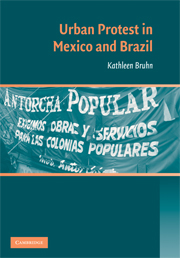Book contents
- Frontmatter
- Contents
- List of Tables
- List of Figures
- List of Abbreviations
- Acknowledgments
- 1 Riding the Tiger: Popular Organizations, Political Parties, and Urban Protest
- 2 Setting the Stage: Research Design, Case Selection, and Methods
- 3 The Limits of Loyalty
- 4 A Union Born Out of Struggles: The Union of Municipal Public Servants of São Paulo
- 5 Partisan Loyalty and Corporatist Control: The Unified Union of Workers of the Government of the Federal District
- 6 Clients or Citizens? Neighborhood Associations in Mexico City
- 7 Favelas and Cortiços: Neighborhood Organizing in São Paulo
- 8 The Dynamics of Protest
- Appendix
- Selected Sources
- Index
4 - A Union Born Out of Struggles: The Union of Municipal Public Servants of São Paulo
Published online by Cambridge University Press: 26 July 2009
- Frontmatter
- Contents
- List of Tables
- List of Figures
- List of Abbreviations
- Acknowledgments
- 1 Riding the Tiger: Popular Organizations, Political Parties, and Urban Protest
- 2 Setting the Stage: Research Design, Case Selection, and Methods
- 3 The Limits of Loyalty
- 4 A Union Born Out of Struggles: The Union of Municipal Public Servants of São Paulo
- 5 Partisan Loyalty and Corporatist Control: The Unified Union of Workers of the Government of the Federal District
- 6 Clients or Citizens? Neighborhood Associations in Mexico City
- 7 Favelas and Cortiços: Neighborhood Organizing in São Paulo
- 8 The Dynamics of Protest
- Appendix
- Selected Sources
- Index
Summary
Among the most difficult roles for Leftist governments to assume is that of employer, particularly when they must juggle this role against the demands of affiliated unions of public employees. In the opposition, Left-leaning parties can feel free to champion the claims of public employees for higher wages, better benefits, and job security. In power, satisfying these demands may conflict with budget constraints and with competing demands for public services. The tension between defending labor and “governing for everyone,” between the representation of one's own base and the requirements of good government, has put many a Leftist mayor between a rock and a hard place. Moreover, unions may expect more from Leftist governments than from conservative governments, compounding the potential for conflict. As a result, “the phenomenon [of conflict with municipal unions] is present in almost all experiences [of Left government in Latin America], despite the different characteristics of the unions.”
The next two chapters examine one arena where we can observe these conflicting expectations closely: municipal employee unions in Mexico City and São Paulo. What makes the comparison particularly compelling is the fact that while municipal employee unions are affiliated with the Left (PT) in São Paulo and Brasilia, they are affiliated with the Left's political rival, the PRI, in Mexico City. If party alliance drives behavior, we should see contrasting reactions to Left electoral victory.
- Type
- Chapter
- Information
- Urban Protest in Mexico and Brazil , pp. 62 - 89Publisher: Cambridge University PressPrint publication year: 2008



